Yemen's Houthis launched an anti-ship ballistic missile in retaliation for overnight American and British strikes targeting the Iran-backed rebels, a US general said.
"We know that they have fired at least one missile in retaliation," Director of the Joint Staff Lieutenant General Douglas Sims told journalists, adding that it did not hit any ships.
The United States and Britain targeted nearly 30 locations using more than 150 munitions, Mr Sims said, updating earlier figures.
The Houthis have carried out a growing number of drone and missile strikes on the key international shipping route through the Red Sea since the Gaza war erupted with Hamas's unprecedented 7 October attack on Israel.
The rebels - who say they are acting in response to Israel's military assault on Gaza - have controlled a major part of Yemen since civil war erupted there in 2014, and are part of the Iran-backed so-called "axis of resistance" arrayed against Israel.
Earlier today, tens of thousands of Yemenis gathered in several cities to hear their leaders condemn US and British strikes on their country.
The US and Britain carried out dozens of air strikes on Houthi military targets overnight, widening a wave of regional conflict unleashed by Israel's war in Gaza.
"Your strikes on Yemen are terrorism," said Mohammed Ali Al-Houthi, a member of the Houthi Supreme Political Council, referring to the US. "The United States is the Devil."
After Hamas attacked Israel on 7 October, triggering Israel's assault on Gaza, the Iran-aligned Houthis began attacking shipping lanes and firing drones and missiles towards Israel, saying they would not stop until Israel's offensive stopped.
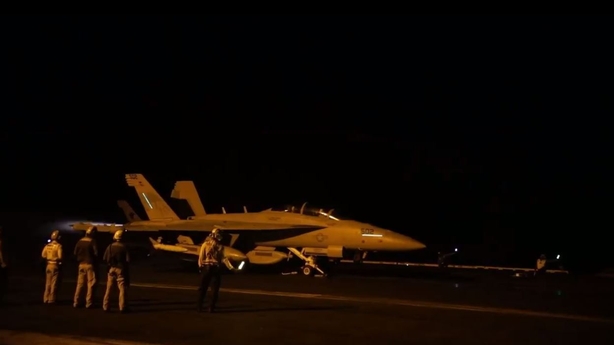
The Houthis said they would target all ships heading to Israel, more than 1,609km away, and warned international shipping companies against using Israeli ports.
The groups hold the US, Israel's closest ally, partly responsible for the crisis and the scope of Israel's massive response.
"We did not attack the shores of America, nor did we move in the American islands, nor did we attack them. Your strikes on our country are terrorism," said Mr Al-Houthi.
"They are terrorists and they are amazing at lying to the people of the world, but the awareness of the Yemeni people is a different awareness. Do you, Yemeni, think that America is defending itself or is it a terrorist?"
We need your consent to load this Datawrapper contentWe use Datawrapper to manage extra content that can set cookies on your device and collect data about your activity. Please review their details and accept them to load the content.Manage Preferences
The Iraqi militia group Harakat al-Nujaba, also aligned with Iran, said that American interests and countries allied to the US would not be safe from now on.
In Sanaa, protesters stamped on Israeli and American flags.
US and allied forces have been attacked at least 130 times in Iraq and Syria since mid-October, according to Washington.
The US has no plans to deploy more forces to the region, Pentagon spokesman Patrick Ryder said.
'America and Britain will have to pay a heavy price'
The strikes targeted an airbase, airports and a military camp, the Houthi rebels' Al-Masirah TV station said, with AFP correspondents and witnesses also reporting they could hear bombardments.
A Houthi official said that five of its fighters were killed, with six wounded, in the attacks.
"Our country was subjected to a massive aggressive attack by American and British ships, submarines and warplanes," Houthi Deputy Foreign Minister Hussein Al-Ezzi said, according to official rebel media.
"America and Britain will have to prepare to pay a heavy price and bear all the dire consequences of this blatant aggression," he said.
US President Joe Biden called the US and British strikes a "defensive action" after the Red Sea attacks and said he "will not hesitate" to order further military action if needed.
The strikes involved fighter jets and Tomahawk missiles, the US Air Forces Central Command said in a statement.
It said 60 targets at 16 Houthi locations were hit by more than 100 precision-guided munitions.
On Jan. 11 at 2:30 a.m. (Sanaa time), U.S. Central Command forces, in coordination with the United Kingdom, and support from Australia, Canada, the Netherlands, and Bahrain conducted joint strikes on Houthi targets to degrade their capability to continue their illegal and… pic.twitter.com/bR8biMolSx
— U.S. Central Command (@CENTCOM) January 12, 2024
"Today, at my direction, US military forces -- together with the United Kingdom and with support from Australia, Bahrain, Canada, and the Netherlands -- successfully conducted strikes against a number of targets in Yemen used by Houthi rebels to endanger freedom of navigation in one of the world's most vital waterways," Mr Biden said in a statement.
Unverified images on social media, some of them purportedly of Al-Dailami airbase north of Sanaa, showed explosions lighting up the sky as loud bangs and the roar of planes sounded.
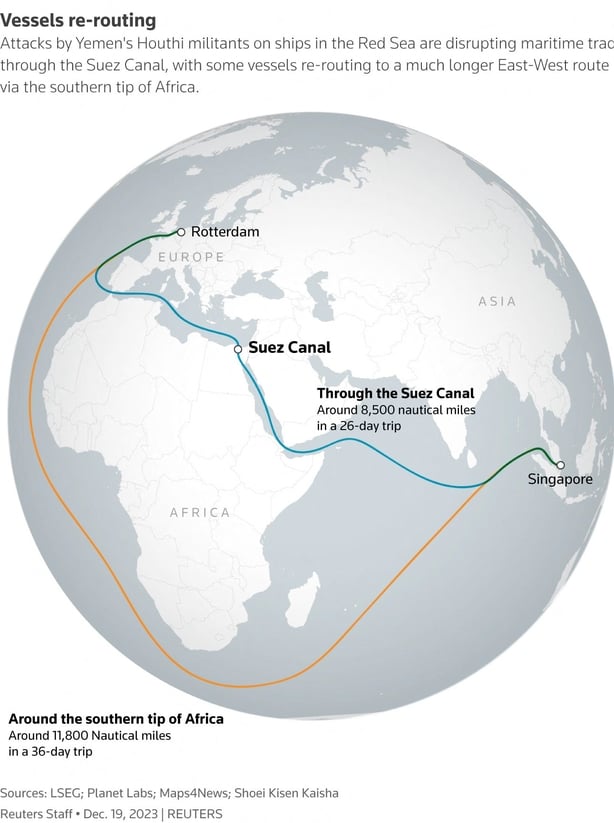
Mr Biden called the strikes a "direct response" to the "unprecedented" attacks by the Houthis, "including the use of anti-ship ballistic missiles for the first time in history".
"These attacks have endangered US personnel, civilian mariners, and our partners, jeopardised trade, and threatened freedom of navigation," he said.
Blaming the Houthis for ignoring "repeated warnings", UK Prime Minister Rishi Sunak said in a statement the strikes were "necessary and proportionate".
US Defence Secretary Lloyd Austin said the strikes "targeted sites associated with the Houthis' unmanned aerial vehicle, ballistic and cruise missile, and coastal radar and air surveillance capabilities".
A joint statement by the United States, Britain, Australia, Bahrain, Canada, Denmark, Germany, the Netherlands, New Zealand and South Korea said the "aim remains to de-escalate tensions and restore stability in the Red Sea".
"But let our message be clear: we will not hesitate to defend lives and protect the free flow of commerce in one of the world's most critical waterways in the face of continued threats," it said.
The Houthis said there was "no justification" for the air strikes and warned that attacks on Israel-linked shipping would continue.
"We affirm that there is absolutely no justification for this aggression against Yemen, as there was no threat to international navigation in the Red and Arabian Seas, and the targeting was and will continue to affect Israeli ships or those heading to the ports of occupied Palestine," Houthi spokesman Mohammed Abdulsalam posted on X, formerly Twitter.
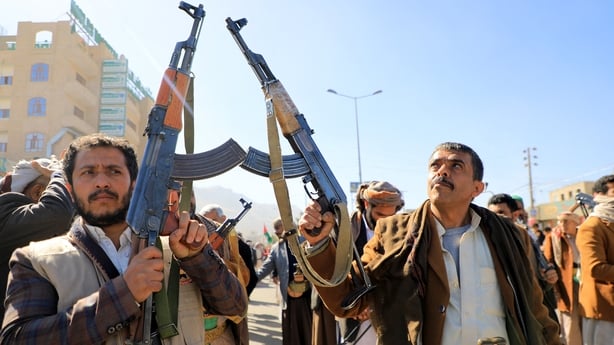
Yemen's neighbour Saudi Arabia, which is trying to end its involvement in a nine-year war with the Houthis, urged against escalation.
"The Kingdom of Saudi Arabia is following with great concern the military operations," a foreign ministry statement said, calling for "self-restraint and avoiding escalation".
The Western strikes could risk turning an already-tense situation in the Middle East into a wider conflagration pitting the US and Israel against Iran and its regional proxies.
The Houthi rebels say they are acting in solidarity with Palestinians in response to Israel's bombardment of Gaza after the 7 October attack, and have launched a series of drones and missiles towards Israel.
Israel has also been facing cross-border fire along its northern frontier from Iran-backed militants in Syria and Lebanon, particularly the Hamas-aligned Hezbollah, and has responded with strikes of its own in both countries.
US and allied forces in Iraq and Syria have also faced stepped-up attacks since the outbreak of the war in Gaza, with Washington responding to several by bombing the sites of pro-Iran groups.
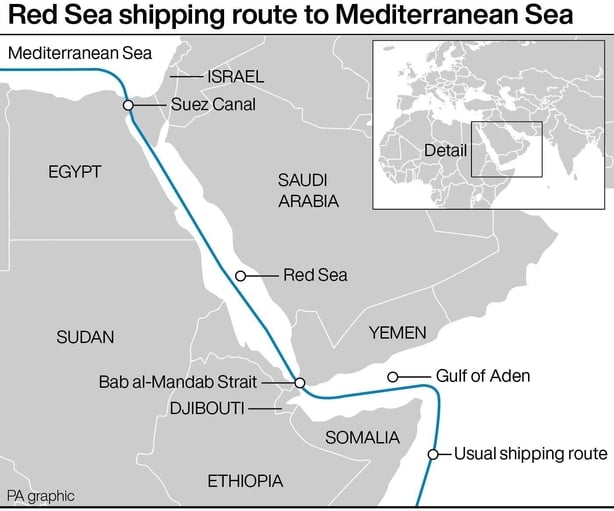
Consequences
The US and its allies had issued a series of increasingly stern warnings to the Houthis to stop the shipping attacks, although Washington has been wary of inflaming regional tension.
Washington set up an international coalition in December - dubbed Operation Prosperity Guardian - to protect maritime traffic in the area, through which 12% of world trade flows.
Twelve nations led by the US warned the Houthis on 3 January of "consequences" unless they immediately stopped attacks on commercial vessels.
On Tuesday, however, the Houthis launched what the UK called their most significant attack yet, with US and British forces shooting down 18 drones and three missiles.
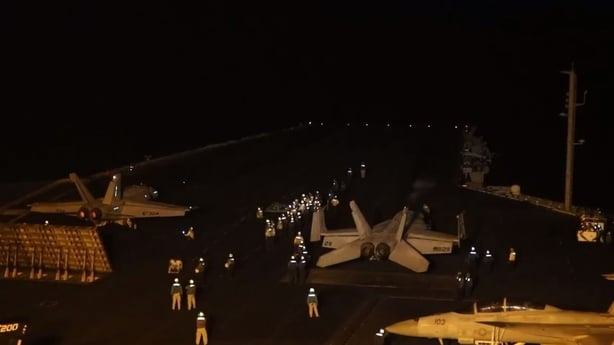
The final straw for the Western allies appeared to come early yesterday when the US military said the Houthis fired an anti-ship ballistic missile into a shipping lane in the Gulf of Aden.
It was the 27th attack on international shipping in the Red Sea since 19 November, the US military said.
The intensifying attacks have caused shipping companies to divert around South Africa's Cape of Good Hope, sparking fears of a shock to the global economy.
The US strengthened its military posture in the region immediately after the 7 October attacks on Israel and warned Iran and its allies not to escalate the situation.
The US was initially cautious in its response because it is seeking to preserve a fragile peace in Yemen, where a decade of civil war and a Saudi-led coalition's military campaign have led to one of the world's worst humanitarian crises in the Arabian peninsula's poorest country.
